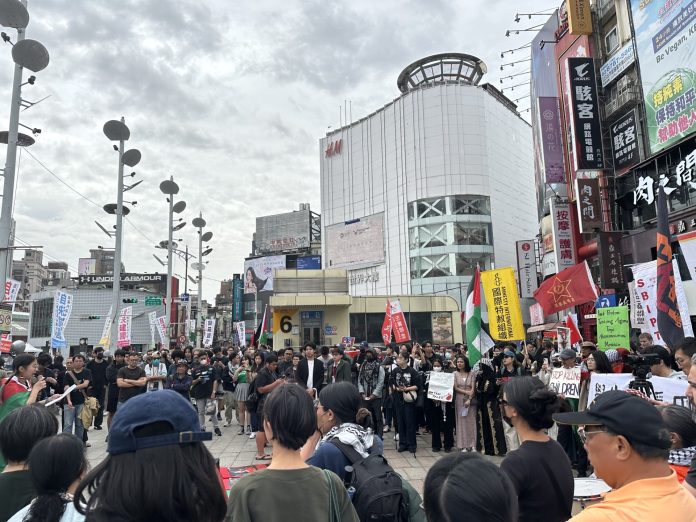

What protesters and the organisers of the Harbour Bridge Protest hoped the world would see seems to have taken root.
A Taiwanese pro-Palestinian activist with a background in sociology (who asked not to be named) said she was “amazed” when she saw the Habour Bridge protest in the news. She applauded Australians’ bravery.
“I think my first reaction is wow. To see the whole bridge filled with people is just shocking. When you block the road, you are actually disrupting people’s lives. And so I think that they are brave.”
But the activist felt a “complex feeling”.
“ I feel kind of ashamed that in my country only a few people went on the street for it,” she said, noting that just days before the protest in Australia a rally in Taipei had drawn no more than 300 people.
Asked about the general sentiment in Taiwan, the activist said most people “either don’t care or don’t know much”, with those who do take a stance often being “pro-Taiwan independence supporters backing Israel”.
She said much of the pro-Israel sentiment stems from geopolitics.
“ I think their viewpoint of the whole world is a really simplified US-China dichotomy and so what they care about is which country supports Taiwan and which doesn’t,” she said, explaining that China’s ambiguous stance on the conflict – particularly its refusal to condemn Hamas’s October 7 assault on Israel and its strong diplomatic ties with Palestine, has led pro-independence Taiwanese to view Palestine as a “threat”.
Many also view Israel as a “victim of invasion” and even “a role model for Taiwan”, drawing parallels of Israel’s resistance against its surrounding Arab nations to Taiwan’s constant exposure to threats from China.
She added that others, despite acknowledging the genocide, believe “Taiwan cannot openly support Palestine” due to its strong military and economic reliance on the US, a key ally of Israel.

And many in Taiwan “buy into the narratives of terrorism constructed by the West” leading them to consider Hamas as “terrorists with arms”, equating support of Palestine as “supporting terrorism”.
Further reinforcing the stigma is the “Taiwan’s media representation”.
“Reports from outlets like Al Jazeera often highlight how Israel blocks or weaponises humanitarian aid,” she said. “But Taiwan’s mainstream media, even the more progressive ones, focus on Hamas refusing to ceasefire. As a result, many Taiwanese attribute the tragedies in Palestine to Hamas”.
She also pointed to “pinkwashing,” noting how Israel’s gender and LGBTQ-friendly image appeals to younger Taiwanese, while Muslim-majority countries like Palestine are often “portrayed as homophobic”.
This, she said, makes Israel appear more “like Taiwan’s ally”.
And on her hopes of making an impact, the Taiwanese activist admitted that while “the movement seems so hopeless” and “little progress has been made” she still believes in the importance of international solidarity.
“I do think it’s important for ordinary people like me and my friends to get involved,” she said. “It’s normal not to see the real impact of international solidarity within a short time. But if you don’t speak up, the world is still going to run as is, and the oppressed will still be oppressed. And even if there’s no major impact, what if the public started to discuss this issue?”
For her, the conflict is also a mirror for Taiwan’s own past.
“When you look back to Taiwan’s history, the Han Chinese ethnic group, we have also colonised the Indigenous people in Taiwan,” she said. “If we started to understand the history of how Palestinians were colonised by Israel, there may be a chance to also reflect on our history, which we haven’t been sensitive and reflective enough about.”
Asked how she educates herself about the conflict and ensures balance when forming her opinions, she said comparisons between pro-Israel and pro-Palestine media “need not and cannot be made”.
“I know people often try to weigh different media sources in their search for truth. But the reality is, in this case, they [Israel and Palestine] are two different entities with a large power imbalance,” she said.
“So I think those closest to the truth are the journalists and content creators risking their lives to report from the ground in Gaza, and even more so videos made by people who are living through it and witnessing the pain. Those are the sources I trust.”
She urged people to rethink the use of the term “terrorism – a narrative that has been historically “used by Western imperialists to stigmatize Muslim and their resistance”.
“Hamas originated from Israel’s colonialism and massacre in Palestine, so why can’t it be understood as a force of resistance?” she asked.
“Is mass killing of civilians not a form of terror? Then why are Israel, the US, and other countries that commit, fund or support genocide not considered terrorists?
“When people are discriminated against, starved, expelled from their homelands, killed, why do we still expect them to not use violence?”
Despite these frustrations, she remains committed to pushing for greater awareness and solidarity with Palestine in Taiwan.
“Every day I see the news of Palestinians being killed and it’s just really hard to ignore because it’s so unacceptable,” she said.
“There are people in Taiwan who are still trying really hard to bring attention to this issue. Some are also trying to escalate the movements to make a real impact. I also have my comrades who are fighting for the same cause. And this is my motivation.”